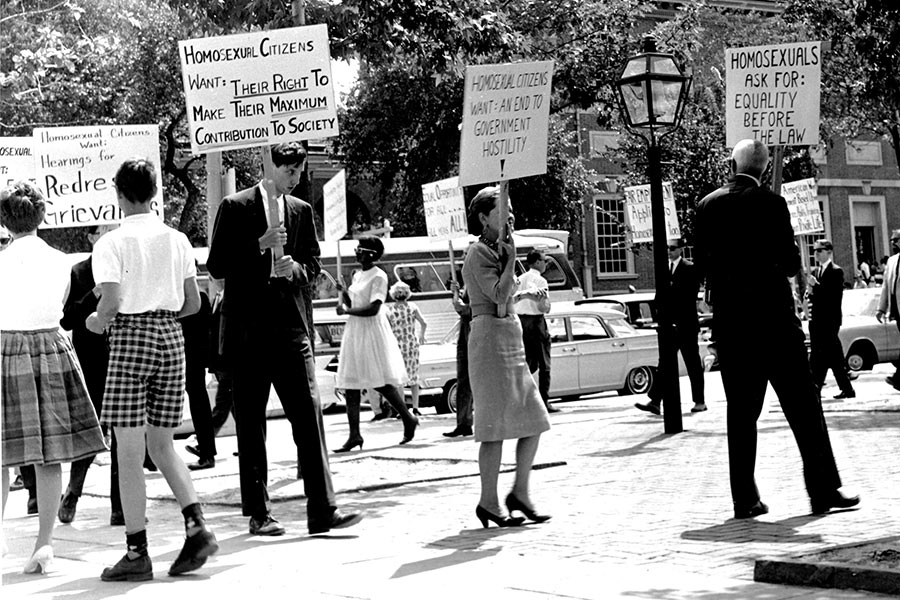This Independence Day will have more meaning for LGBT older adults than almost any other July 4 in our community’s history. The steps that my friend, the fearless Barbara Gittings, and the other brave picketers first took in front of Independence Hall 50 years ago spurred a march that continues today for independence and equality for all of us.
Those “Reminder Day” protests are, sadly, still relevant because we are not yet all equal under the law. Gittings and her fellow demonstrators pointed out that, although the Declaration of Independence claims that we all share the right to “life, liberty and the pursuit of happiness,” not all of us share that status. We are still not all equal, nor do we enjoy the same freedom to live our lives as we choose.
Many of us remember the other remarkable changes that were taking place 50 years ago. Those changes affect us all today, in different ways than do Reminder Days. Fifty years ago, the Older Americans Act, Medicare and Medicaid, the Voting Rights Act and many other pieces of social-support and civil-rights legislation were enacted. They have given us many of the protections, resources and services that we need as we age.
Twenty-five years ago, the Americans with Disabilities Act was added to the list of civil-rights legislation and it has reduced discrimination and expanded access to the communities in which we choose to live and work.
Yet, those laws are under attack today. Voting rights are being withdrawn. The OAA still does not recognize the unique issues facing LGBT older adults. In too many places in this country, it is legal to fire someone, deny them housing or refuse to serve them a meal in a restaurant because they are LGBT. The pushback against marriage equality will continue. Medicare and Medicaid coverage for older adults and people with disabilities continue to be used as political footballs that often leave the most vulnerable members of our communities without the care and services they need to remain independent and out of institutional care. Discrimination within our own communities, in the form of ageism, racism, sexism, HIV-apartheid and bi-, trans- and disabila-phobias, persists and weakens all of us.
The challenge ahead is to continue the march that began on Reminder Day 1965. The voices raised against us and against our goals of equality and independence and dignity as we age will grow louder as we try to move forward. Silence on our part is not now, and never has been, acceptable.
Five years ago, a group of community activists and aging-services professionals formed an organization dedicated to assuring that members of the LGBT communities would have every right and opportunity to age successfully, at every age. Today, that organization, the LGBT Elder Initiative (LGBTEI), advocates for resources and services that will help us live independently and vibrantly in our own homes and communities.
Advocating for those services and resources is a challenge. First, we have to overcome the fact that we have been an invisible community because we have never been officially counted. Some actually say that there are no LGBT older adults in their communities, in their neighborhoods or even in their service areas. Getting the government to begin to count us is a critical first step in the development of programs designed to meet our needs as we age.
Creating awareness and building a collective community voice is also critical in this effort. And that voice must be strong enough to be heard over the voices that are pitched against us and that would still deny us our rights and our very existence. Complacency is not an option.
Gittings and company put soles on the ground to make their point. Their physical presence was enough to shock the system and provoke the response that has led to change. Today’s tactics are somewhat different. We now sit at the table and debate, propose and discuss how to institute change and build inclusion. We sit at the computer and send messages of support out into the ether. We use small devices that fit into the palms of our hands to tell people across the country and around the world what we think and to urge them to act.
But to be effective, we must all use all of the tools in our toolbox. We no longer shock, but we must convince. We must demonstrate political and economic strength. We must speak as one community seeking the rights and the ability to live our lives as equal to all other citizens, independently and free from the oppression of every form of discrimination that still exists.
